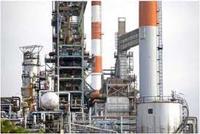-
Well water contaminants highest near natural gas drilling: study
A new study of 100 private water wells in and near the Barnett Shale showed elevated levels of potential contaminants such as arsenic and selenium closest to natural gas extraction sites. Researchers believe the increased presence of metals could be due to a variety of factors including: industrial accidents such as faulty gas well casings; mechanical vibrations from natural gas drilling activity disturbing particles in neglected water well equipment; or the lowering of water tables through drought or the removal of water used for the hydraulic fracturing process. Any of these scenarios could release dangerous compounds into shallow groundwater.
-
-
Senate panel to vote this week on cybersecurity bill
The Senate Commerce Committee will this week vote on an industry-backed cybersecurity bill before Congress takes an August recess. Last year the Senate twice tried, and failed, to pass a cybersecurity bill because of GOP opposition to it. GOP lawmakers objected to a bill imposing mandatory cybersecurity standards on industry, and instead called for a bill which would make the adoption of cybersecurity standards voluntary. The bill now being considered in the Commerce Committee calls for industry and NIST to develop a cybersecurity framework for industry (something NIST is already doing following a presidential executive order), and for industry voluntarily to adopt it.
-
-
The hidden dangers of south-of-the-border hot sauce

In the last decade, the U.S Food and Drug Administration (FDA) issued several warnings about and recalls of imported food products that exceed federal standards for lead. Products containing chili peppers and salt, such as Mexican-style candies, were often suspected as sources of lead contamination. Researchers now find elevated lead levels in some hot sauces imported from Mexico. The researchers urge USDA and the FDA to develop enforceable screening standards for hot sauce.
-
-
La. flood protection agency sues 97 energy companies for wetland destruction
A Louisiana state agency on Wednesday filed a lawsuit against ninety-seven energy companies, charging that the companies have inflicted severe damage on fragile coastal wetlands, damage which left New Orleans and other Louisiana cities more vulnerable to hurricanes and storm surges. The agency wants the court to order these companies to pay steep penalties which would help the state restore the wetlands and thus recreate the natural buffer which had protected New Orleans.
-
-
Natural disasters caused $85 billion global economic loss during first half of 2013
Data show that economic losses from global natural disasters during the six month period ending 30 June totaled $85 billion (2012: 75 billion) — around 15 percent lower than the 10-year (2003-2012) average of $100 billion. Insured losses for the period reached $20 billion (2012: $25 billion) — approximately 20 percent below the 10-year average of $25 billion. Roughly 50 percent of the insured losses resulting from natural disaster events were recorded in the United States.
-
-
Lawmakers, citing shortcomings, threaten funding for chemical plant safety program

Heads of three congressional panels urge DHS secretary Janet Napolitano to take to correct shortcomings in the Chemical Facilities Anti-Terrorism Standards (CFATS) program. “As the authorizers and appropriators of this program, we write to you to express serious reservations about continuing to extend CFATS funding without evidence of substantial programmatic improvement,” the three chairmen write in their letter to Napolitano. The lawmakers pointed to flaws in the program’s risk evaluation system, compliance hurdles, implementation delays, and the failure of the program to identify vulnerable facilities.
-
-
Motivating businesses to adopt building resiliency standards
Increased resilience for buildings in the face of hurricanes, earthquakes, terrorism, or cyberattacks has been a major national security focus over the past decade. Such resilient buildings not only would be less susceptible to damage and work interruption but could become community gathering places in a general crisis. It will not be easy, however, to secure voluntary adoption of resiliency standards by industry and builders without adequate justification.
-
-
Harvesting carbon dioxide to produce electricity
Electric power-generating stations worldwide release about twelve billion tons of CO2 annually from combustion of coal, oil, and natural gas. Home and commercial heating produces another eleven billion tons. Researchers developed a technology which would make the CO2 react with water or other liquids and, with further processing, produce a flow of electrons that make up electric current.
-
-
Cost to U.S. of cybercrime lower than earlier estimates
The Center for Strategic and International Studies (CSIS) and security firm McAfee published a revision of McAfee’s previous estimate of the cost of cybercrime to the United States, reducing the amount from $1 trillion to $100 billion. Experts say this should not be a reason for complacency.
-
-
White House considering incentives for cybersecurity compliance
The Obama administration is considering whether to back tax breaks, insurance perks, and other legal benefits for companies which bolster their digital defenses. The incentives, which include limited protections from legal liability and tax incentives, would be set up to persuade power plants, water systems, chemical plants, and other critical infrastructure companies to comply with the voluntary cybersecurity rules which are being drafted as part of President Obama’s cybersecurity executive order.
-
-
UN warns regulators of mobile phone vulnerabilities
The United Nations is warning telecommunications regulators and government agencies about significant vulnerabilities in cell phone technology which would allow hackers to attack at least half a billion mobile phones worldwide.
-
-
Food safety, farm groups oppose Smithfield sale

A group of farm and food safety advocates is pushing federal regulators to prevent the sale of Smithfield Foods to Chinese food giant Shuanghui International Holdings. The coalition argues the sale could hurt domestic food safety, cause economic damage in rural communities, and could be a threat to national security.
-
-
U.K. water industry: fracking may contaminate U.K. drinking water
U.K. water companies have warned the shale gas industry that the quality of U.K. drinking water must be protected at all costs and fracking must not harm public health. Shale gas fracking could lead to contamination of the water supply with methane gas and harmful chemicals if not carefully planned and carried out.
-
-
Georgia Tech’s VentureLab ranks No. 2 among university-based incubators
Georgia Tech’s VentureLab helps create startup companies based on Georgia Tech research. Since its formation in 2001, VentureLab has launched more than 150 technology companies which have attracted more than $700 million in outside funding. VentureLab program has been ranked second in the world in a new benchmarking study. The study, conducted by UBI Index, examined 150 university-based business incubators in twenty-two different countries.
-
-
Provision in House farm bill could postpone FDA food safety regulations
The largest overhaul of food safety regulations in the United States in more than five decades could be in danger as a result of an amendment in the farm bill that passed the House last week and sent to the Senate Tuesday. The House farm bill (H.R. 2642)has a provision requiring the Food and Drug Administration (FDA) to direct a “scientific and economic analysis” of the regulations under the Food Safety and Modernization Act (FSMA).
-